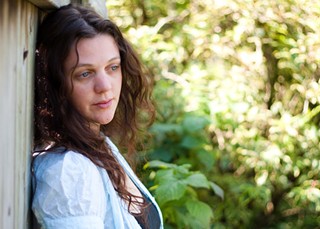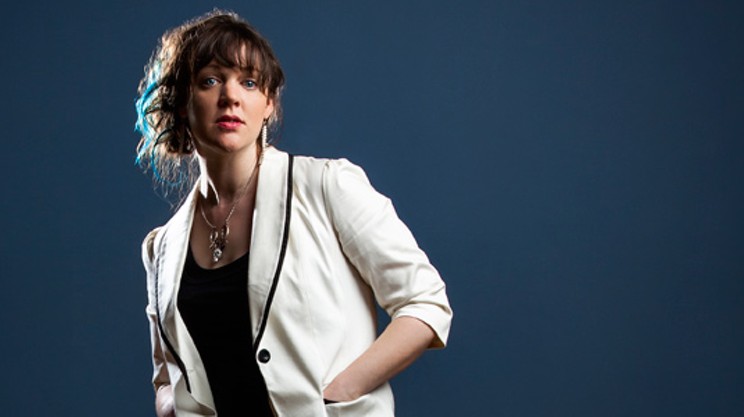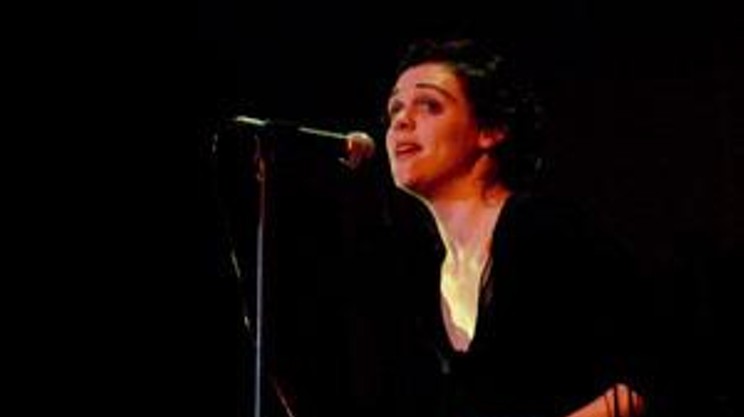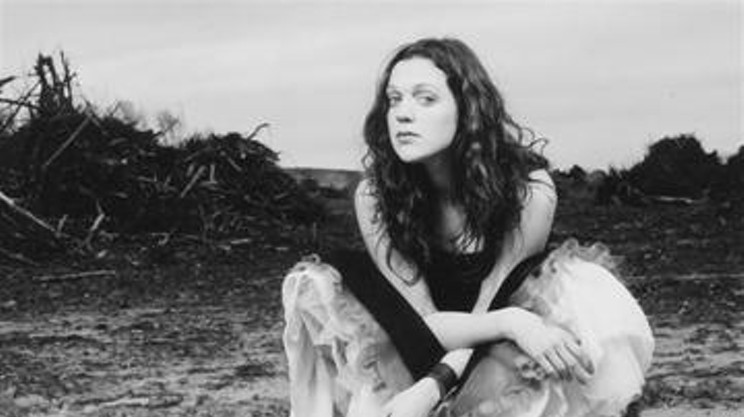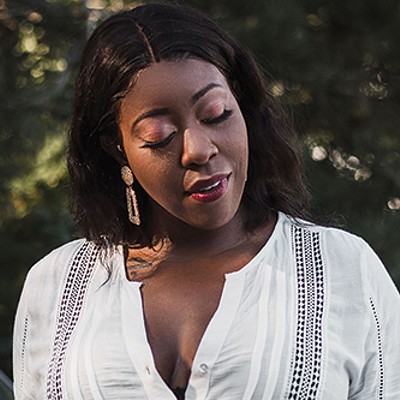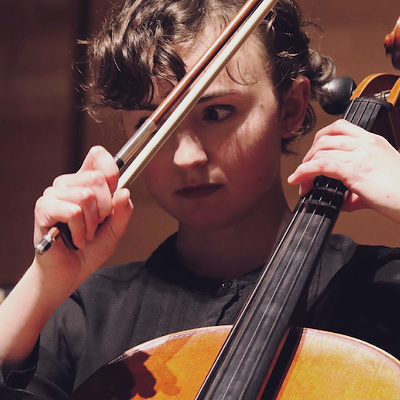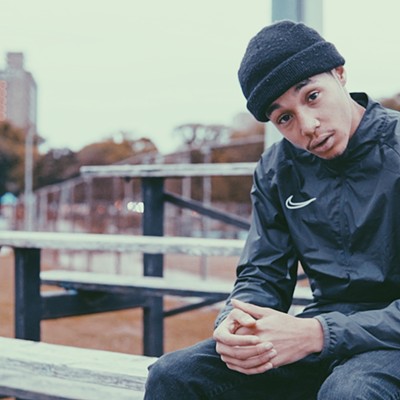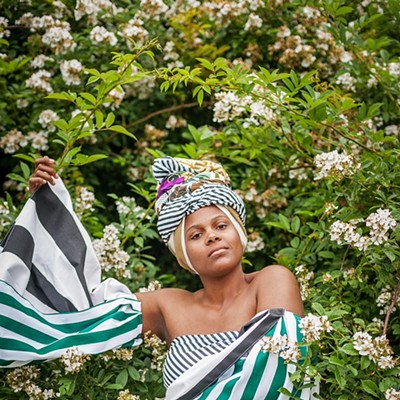Amelia Curran has a good laugh. Seated in the corner of a cozy downtown bar, the Halifax musician at first appears grounded, serious, a little intimidating---her steely blue eyes appraise you, polite but guarded. But as the night goes on and beers are drained, her laugh ebbs out from the ends of sentences. It's one of those low, musical chuckles that makes you feel like, "yeah, things might actually be OK after all." When she tells the story of her first gig many years ago in her hometown of St. John's, Newfoundland, she laughs a lot.
The veteran musician Shirley Dalton asked Curran---a busker at the time---if she would play a 20-minute gig between sets for her Dalton-Rose Band at a local tavern.
"The place wasn't big, but it was crammed," Curran says. "The band had played this roaring set, and then Shirley put me onstage and introduced me. She plugged in my guitar for me, and then everyone in the bar stood up and surrounded her. They wanted to buy her drinks and talk to her, and I'm sitting there playing these Tracy Chapman songs."
After two or three songs, Curran says she stood up and left the bar. "I was mortified," she recalls. "And that can still happen, if you're playing in a place for the first time. But I've got a thicker skin for it now."
Things are different for Curran these days. After a decade of living and working and promoting herself in Halifax, Curran signed with Toronto's Six Shooter Records last year. She toured frequently this summer and made scores of new fans on the festival circuit across the country. This fall, she's headed to Europe for the first time. But it's her fifth album, Hunter, Hunter, that marks the true turn. War Brides may have taken four years for Curran to complete, but Hunter, Hunter, recorded over a 20-month period in St. John's, feels like the product of a lifetime. It is a big achievement, and Curran has dug deep in every aspect of the album's production, beginning with her own writing process.
The scenario she describes is romantic---cigarettes, alcohol, scraps of scratched-out lyrics---but also begs for a type of soul-searching that's embarrassing, even painful.
"It's important that a song is as honest and truthful as you can get," she says. "I drink and smoke when I write---it's a liquid courage thing because it's terrifying. You have to make room for a certain type of humiliation and shame to be able to write something as honestly as you want. If I look at the lyric and I'm a little humiliated, it might be the perfect lyric. If I'm going to write a good song that's meaningful, I can't pretend not to be emotional or slightly crazy."
Hunter, Hunter aches with honesty. A song like "Ah Me" is instantly memorable, with its low-level harmonies and tingling guitars, but it also has a certain mournfulness that leaves the listener raw, like the aftermath of a sob. The song was recorded in an abandoned CBC building in downtown St. John's during a freezing cold winter with veteran Newfoundland producer Don Ellis and a host of talented local musicians. Although Curran says she found the place scary, there's a certain lift to her voice that suggests the experience was electric---an uncomfortable place made for recording songs borne from discomfort.
"We brought in a generator for the sound board and space heaters for all the rooms, but you had to turn them off to get rid of the noise," Curran says. "So you had freezing musicians and freezing instruments that needed to be tuned every five minutes. No running water. It was hilarious."
Another album standout is one of Curran's older songs, "The Mistress." It has been slowed down to showcase Curran's voice: pained, sensual and vindictive all at once. "No one asks for my opinion because you don't want to hear it," she sings. "I swear I'm only human wishing I could disappear." Curran says the song was inspired by a period of what she calls "young drama"---a wayward time in Halifax, full of "lots of drinking, lots of drugs, lots of doubt."
"When I wrote it, I think I had had enough," she says. "Someone had once told me, 'You're never not yourself'---the idea that even if you're going crazy under the influence of something, you're still always yourself. It stuck with me, even though I reject that idea now---I think you can be pushed into doing things that aren't yourself. I definitely did things in those years that were not me."
Not every song passed muster with Curran, whose standards are high enough that she once scrapped an entire album because it didn't feel right. Several songs from Hunter, Hunter were cut, including "What Will You Be Building." Curran ended up giving the song to Newfoundland folk trio (and Hunter, Hunter collaborators) The Once to record on their own album.
"I quite like the song, but when I performed it, you could tell I wasn't sure of myself," she says. "If the song isn't great, not much is going to happen after that to make it better. You can't have this good piece of work and do it haphazardly or half-assed. It's not right."
Curran is well-suited for a label like Six Shooter, where community is valued and artists are treated well. The story behind her signing is oddly charming.
"I was late with rent every month, eating hot dogs, and felt I could go a lot further," Curran says. "So I did a bunch of research and picked them out as my favourite label. I romanced them. I had never done anything like that before---I'd never jumped up and down and yelled 'Look at me, love me, sign me!'"
Despite Curran's best efforts, the label didn't return her interest. It was only two years later, when the company signed Heather Gibson (of the In the Dead of Winter festival, which Curran co-organizes) as a manager, that Curran was brought along and found out what had really happened. There are two Amelia Currans in the Canadian music industry---the other one works for the Outside Music label. Six Shooter founder Shauna de Cartier though the other Amelia was courting her, got weirded out and deleted all the emails.
"I think it worked out well," Curran says of the mix-up. "I'm not sure I could have handled it two years ago. It's rolling along so comfortably now that it's almost eerie. I welcome the realization that you can actually have people working with you, and not for you---or you for them."
Amelia Curran will never again sit on a stage in a crowded room, muted by an oblivious crowd. Hunter, Hunter officially makes her impossible to ignore. One imagines she will step down after her CD release shows in St. John's and Halifax, buried in friends and well-wishers, a small skeptical grin on her face throughout.
"There's always those little things during a performance that make you think you haven't done well," she says. "But then people come up and tell you how much they love it. But that person who thinks you didn't do a good job will never come up and say 'I don't think you did a very good job.' The cynic in me always keeps that in mind. But there's plenty of shows where you don't feel great during or after. It doesn't mean the song has changed."
She shrugs, and again, she laughs.

